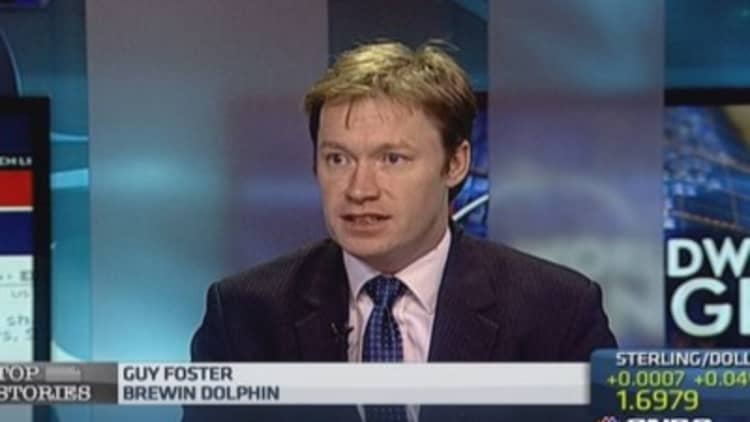Profit warnings from U.K. listed companies have hit their highest level in three years despite a brightening economy, as many firms struggle with stiff competition and currency headwinds, a study reveals.
The first half of 2014 saw 137 profit warnings issued, the highest first half total since 2011 and up 9 percent on the same period last year, according to EY's latest Profit Warnings report.
However, since then, the second quarter has seen the number of profit warnings drop by 11 to 63 from the previous quarter.
Read MoreUK economy expands again, passes pre-crisis peak
Companies are not feeling the benefit of an economic recovery in Britain, EY said. Many sectors, particularly the consumer goods industry, are facing intense competition which is squeezing margins and hurting profits. The rise of the pound, which hit a five-year high last month, is also creating currency headwinds for companies, the report added.
"The pound's rapid rise is one of the biggest pressures on earnings. Although, the problem highlighted in profit warnings isn't one of sales but of currency translation," Keith McGregor, EY's capital transformation leader for Europe, Middle East, India and Africa, said in a press release.
"Price and competition pressures have also intensified. While the recovery has boosted demand, it hasn't eradicated the austerity mind-set of businesses or consumers."
Read MoreS&P upgrades outlook for UK economy
In the first half of 2014, 19 percent of profit warnings cited competitive or pricing pressures, compared with 7 percent in 2013. Adverse currency movements were behind over a fifth of warnings in the first half of the year, compared with just 3 percent in 2013.
Britain's improving economic performance forced the International Monetary Fund to raise its gross domestic product forecast for the country for the second time this year. The Washington-based organisation said Britain would grow 3.2 percent in 2014.
Retailer resilience
In spite of the tough time retailers are experiencing on the U.K. main streets, profit warnings remain at a low level. Companies in the FTSE's "General Retailers" and "Food and Drug Retailers" categories together issued just nine warnings in the first six months of 2014.
But tough competition in the grocery sector in particular is set to continue. In March, Morrisons issued a profit warning in March followed by Tesco last week amid a squeeze on margins from the likes of budget supermarkets Aldi and Lidl.

Read MoreUK retail sales fall short of expectations
"Ultimately, discount grocers don't have the footprint required to mount a serious head-to-head challenge against the major supermarkets. However, they are setting the price agenda and rapidly capturing precious share in a tight market," EY said in a press release.
Analysts said that while issues such as a strong pound as well as a lack of pricing power have hit businesses, problems that stemmed from the banking crisis in the euro zone have continued to affect companies.
"One of the reasons why this is a profitless recovery is because of the banking crisis. A number of companies which should have been allowed to go to the wall were kept in business. It has led to overcapacity and low productivity," Mike Ingram, market strategist at BCG Partners, told CNBC in a phone interview.
'New era' of monetary policy
Another area of concern for companies is monetary policy. Central banks worldwide are considering their next moves with the Bank of England looking at an interest rate hike in the coming months, and the U.S. Federal Reserve approaching the end of its quantitative easing program.
As the so-called "new era" of monetary policy comes, companies will have to deal with greater volatility in financial markets, EY warns.
"Central bank actions have helped to quash volatility, pushing asset prices to pre-crisis highs. However, the countdown to a new monetary era will bring new tests and greater volatility as markets begin to re-price risk," McGregor said.
- By CNBC's Arjun Kharpal


